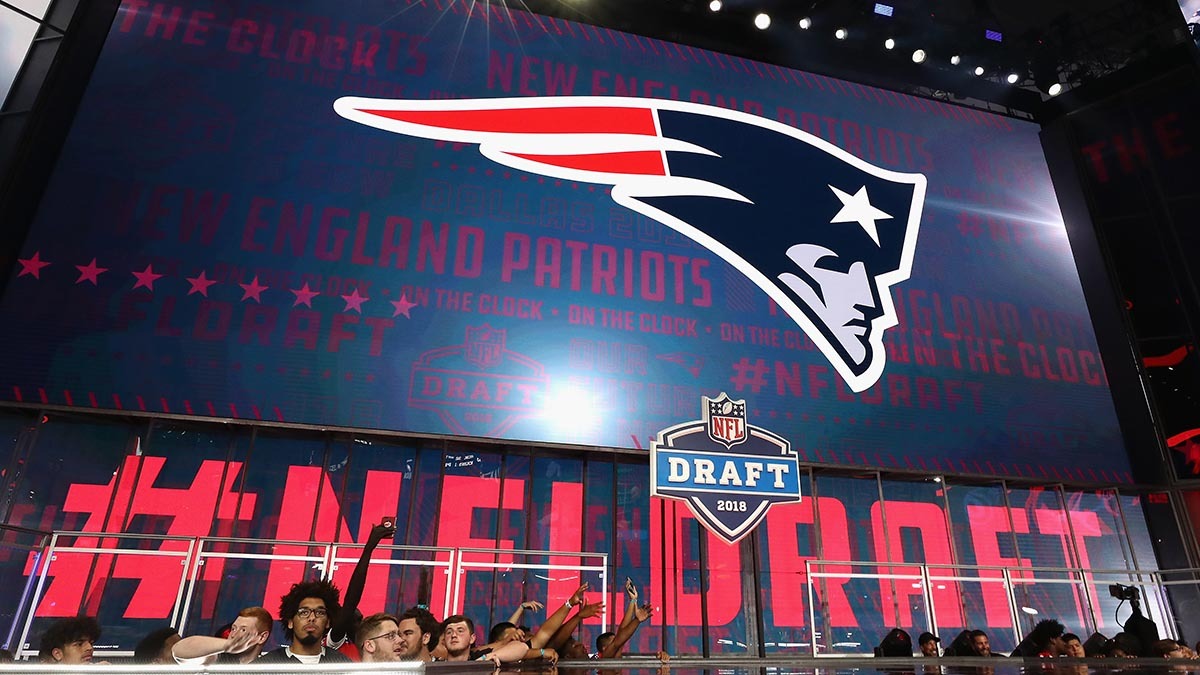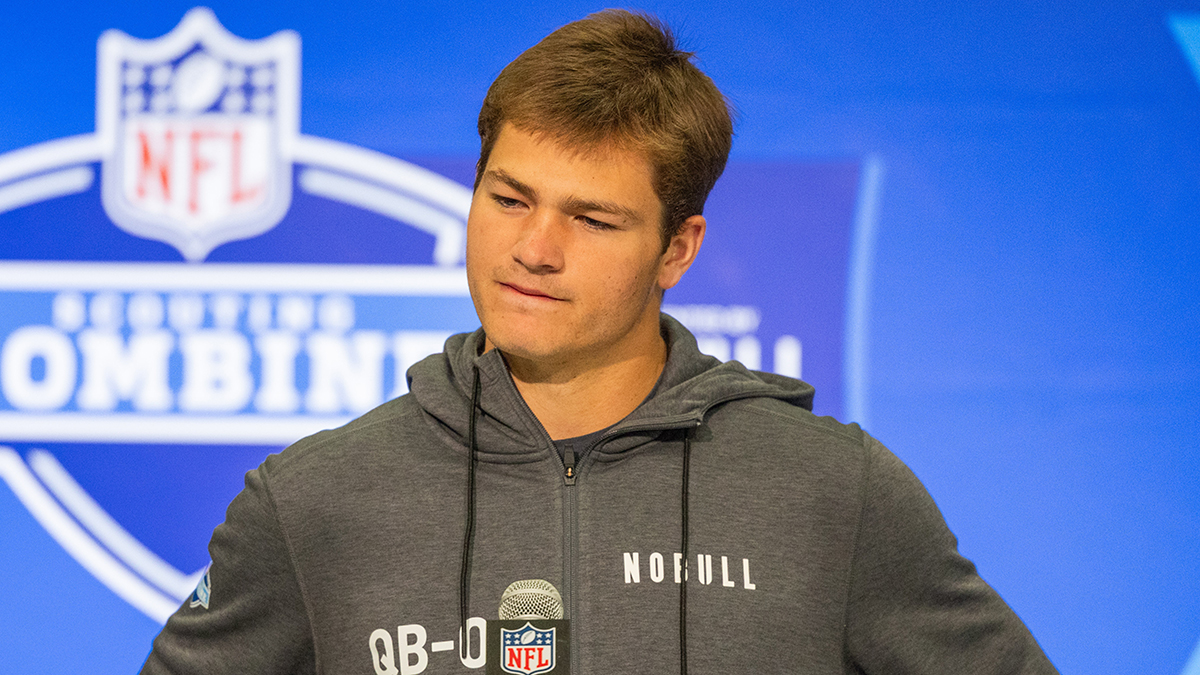Through two days of legal tampering, and as the clock ticked closer to the official start of free agency, the Patriots remained quiet. While Trey Flowers, Trent Brown, Le'Veon Bell and others landed with new clubs for big-money deals, the Patriots came to agreements with veterans Jason McCourty, John Simon and Brandon Bolden.
We can't rule out that the Patriots will spend to bring in a higher-priced free agent or two, but the last few days have been illustrative of Bill Belichick and Nick Caserio's team-building technique lately.
No team loaded up on low-cost veterans like the Patriots in 2018, and no team spent a smaller percentage of its cap on players on rookie contracts, making them one of them oldest teams in the league. When the season opened, the Patriots' average age was 26.8 years old (fourth-oldest in the NFL). Come the postseason, thanks in part to their 41-year-old quarterback and unusually experienced secondary, the Patriots were the oldest team left (27.6). That worked out OK for them.
Those average age numbers are partly explained by the fact that the Patriots have missed on finding consistent contributors at the top of the draft in recent years. Had Dominique Easley worked out, he might've played last year on a relatively expensive fifth-year option. The Patriots didn't have first-round picks in 2016 or 2017. And second-rounders Jordan Richards and Cyrus Jones were jettisoned before the end of their rookie deals.
But the Patriots' spending numbers are so extreme that it's hard not to see some method to the madness in the Patriots front office. OvertheCap.com pegged the Patriots as having a greater percentage of their cap committed to "low" veteran contracts -- any deal at $4.5 cap figure or less -- than any other team last year. They were 32nd in spending on rookie contracts.
MORE PATRIOTS
- Van Noy has great reaction to Jason McCourty's return
- Gronk's agent suggests 'opportunities' could impact 2019 plans
The Patriots weren't trying to swing and miss on some of those high-end picks, of course, but former Buccaneers general manager Mark Dominik explained that they've capitalized on a market inefficiency thanks to their willingness to be older than everyone else.
New England Patriots
"The Patriots haven't drafted great. But they do what I call 'the second draft' really well," he told The Next Pats Podcast during the combine. "Let's look at guys who are already in the league, and let's figure out how they fit into our system. Some of those guys cost a little bit more money because they might be a little bit later in their career . . . Kyle Van Noy or Adrian Clayborn, who I drafted in Tampa. Find a role for that guy at an affordable price and take advantage of the salary cap the way it is, meaning the middle class almost got wiped out of the league."
When the new collective bargaining agreement was signed, the game changed -- and not for the better if you were an average veteran. Rookie deals became more manageable with a contract-slotting system in place, assigning dollar values to draft position. But instead of teams using money saved on rookies to make middle-tier veterans richer, cheaper rookies took up more roster spots, and Pro Bowlers got an even bigger piece of the pie.
"The thought was behind the new CBA, having lived through the last negotiation when I was with the Bucs, was that the middle class was actually getting taken care of," Dominik said. "Like, 'OK, we're actually going to be able pay veterans more money. This is gonna be great. The guys that are making one million are going to be making three or four.' What actually happened was we gave the stars more and more money."
Dominik added, "We took all the money and said, 'Look, we'll figure out the roster from [players] No. 25-45 but let's pay stars, and let's pay them more. No fault of the agent, no fault of the player, but that's where the money ended up going. 'If I'm going to have to budget money for signing this guy that I love on our football team, then I'm going to have to go over here and rob Peter a little bit to pay Paul.' The middle class was Peter . . . The great players get paid. The guys that aren't minimum salary don't make it in the league. I think the Patriots do a really good job about thinking about the middle class."
MORE PHIL PERRY
- Which remaining slot WR make the most sense for Pats?
- Bennett tells Pats he'll remain in locker room during anthem
The approach at One Patriot Place, at least as of right now, seems to be similar. With plenty of time remaining in free agency, the Patriots are currently third in the league in "low" contract spending and 32nd in rookie spending. Those "low" deals include contracts for key players like James White, David Andrews, Rex Burkhead, Lawrence Guy, Patrick Chung and Matthew Slater.
Interestingly, the Patriots aren't the only team that has rolled with a gracefully-aging approach and found success, as the Ringer's Kevin Clark -- who has been writing about big-picture NFL spending for years -- pointed out to The Next Pats Podcast during the combine.
"Oddly enough," Clark said, "the Rams were low in rookie snaps last year. Both Super Bowl teams were very old last year in a weird way. When I say 'old', it's all relative. The average age of an NFL player, especially on offense, has gone down about two years, basically, since the CBA came into play in 2011. You start to look at the trends of the game, and you realize that the Patriots always zig when everybody else zags."
But why be so open to being the oldest kid on the block?
With more and more underclassmen entering the draft, trading away picks for young veteran players -- Brown and Van Noy are recent examples -- may reduce some of the risk of whiffing on a hard-to-project 21-year-old with little college experience. And in the case of someone like Van Noy, a second-round pick in 2014, the Patriots can acquire another team's failure -- a player they might've liked to draft themselves but didn't have the chance to -- for pennies on the dollar.
TOM E. CURRAN
"Some of these guys," Clark said, "are washing out and then the Patriots can get them on the cheap . . . They're able to get these wash-outs at very low cost. They're basically cleaning up everyone else's mistakes. They can churn the roster and say, 'This guy played three years with the Niners and it didn't really work out, and now we're going to stick him at left tackle.' "
Plus, even though those veterans who arrive in New England in exchange for picks are more expensive than rookie options, the ever-rising salary cap makes those more deals easier to absorb than ever.
Another on-the-field advantage to having a roster that skews older is having players who understand schemes -- and more importantly scheme changes -- better than their younger counterparts. Never was that more apparent than with the Patriots defense this past season, and in their secondary especially. Players handled changing positions, coverages and assignments seamlessly all the way through the Super Bowl, completely flummoxing one of the game's brightest offensive minds on its grandest stage in a 13-3 win over Sean McVay and the Rams.
In an age when iPads have facilitated round-the-clock film study, and on a team whose coach shifts his game plans from week to week, having players who can grasp concepts quickly is crucial. And older players, in general, may be able to handle that kind of thing more easily.
"You can really change your philosophy on the fly," Clark said. "And you're doing that with players who are younger than ever? One of the reasons Bill Belichick has been able to succeed is he's been able to change what his team is every single week . . . If you've got really smart guys who are 25 or 26 instead of 21 or 22, you're able to do that. A Devin McCourty, a Jason McCourty, guys who are veterans. If you're going to do the Belichick model, which is just to be able to be adaptable and smart all the time, you don't want a bunch of first-year guys, you don't want a bunch of second-year guys.
"One of the things that has been lost is rookies come in more impressive than ever physically . . . but there's no replacement for experience and smarts. One of the things the Patriots are really freaking good at is understanding that there are inefficiencies out there where a smarter guy who maybe is a step slower is going to play faster than the rookie who runs a 4.2."
MORE NFL FREE AGENCY
Belichick is also adept at understanding when to cut bait on a mistake. Players like Easley, Jones and 2016 third-rounder Tony Garcia didn't last long in part because Belichick likely has greater job security and more leeway than any other coach in the league. As long as Richards stuck around in New England, Belichick isn't married to making top-end picks work to prove a point. That impacts the team's average age and spending as well.
"Some of the worst players in the NFL," Clark said, "are fourth-year rookies who GMs are still trying to justify. Bill Belichick is just not going to do that."
At some point, of course, there is going to have to be a shift. The Patriots are going to have to turn over their core as Tom Brady, Rob Gronkowski, Julian Edelman, Dont'a Hightower, McCourty, Slater and Chung all would readily admit they're closer to the end than the beginning.
Maybe, with 12 picks in this year's draft class and six in the top 101, this is the year the Patriots invest in a drastic infusion of youth to avoid any steep drop-off that may be looming as their core ages. But they let a 25-year-old pass-rusher in Flowers walk via free agency, and they dealt for 33-year-old Michael Bennett to help fill the void. They came to terms with three low-cost veterans before we heard about them inking anyone in their mid-20s looking for a second contract.
At least at this point, the Patriots aren't getting any younger. But they don't seem to mind. And no one can argue that it hasn't worked.
"The Patriots understand the trends of the game better than any other franchise, and they understand how to take advantage of it," Clark said. "We've seen it so many times. Belichick has talked about it. They switched from a 3-4 to a 4-3 because they realized that nose tackles got too expensive. They'll shift their entire philosophy around based on what players they can acquire for cheap. And right now they understand that they'd rather have a guy making $3 or $4 million than a bunch of rookies. And the NFL is not going to learn to catch up with that."
Click here to download the new MyTeams App by NBC Sports! Receive comprehensive coverage of your teams and stream the Celtics easily on your device.


